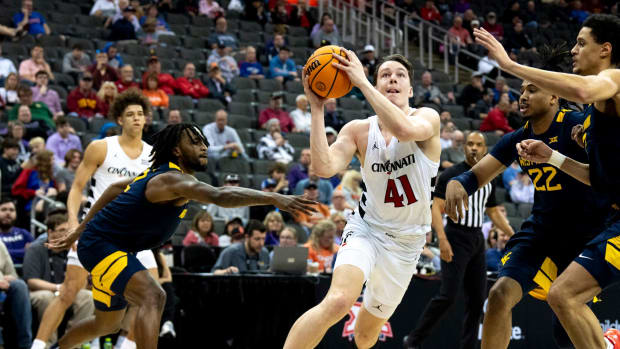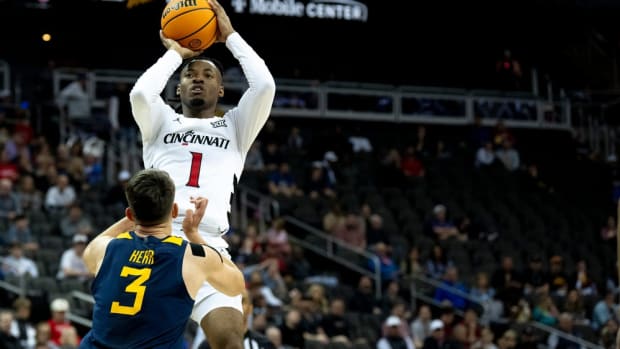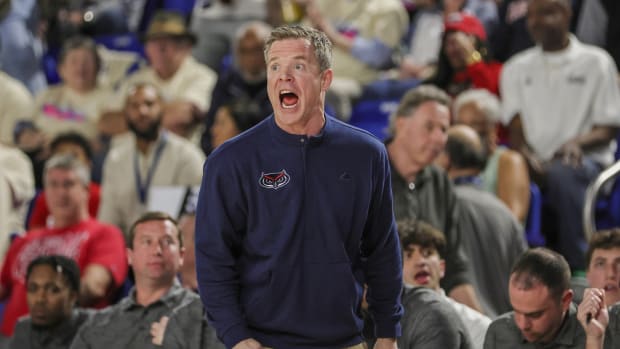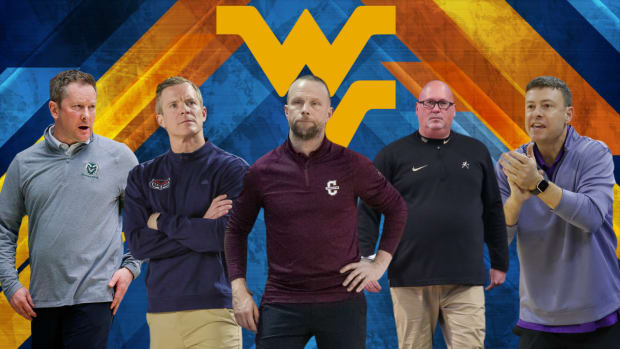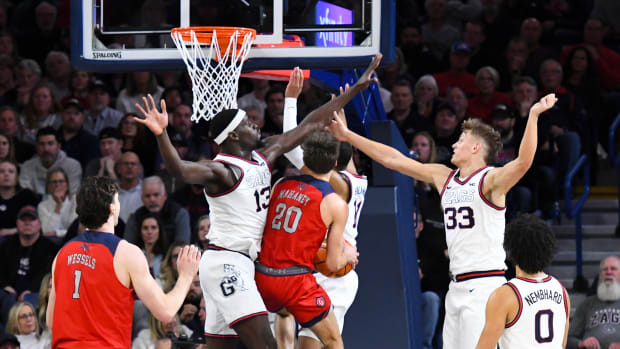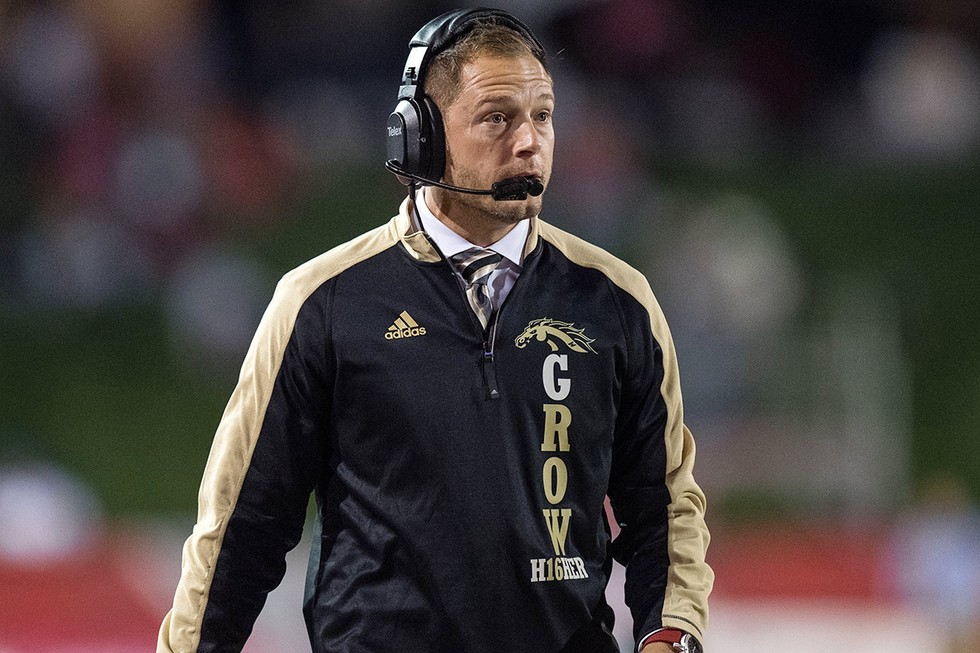
The moon shot: P.J. Fleck rowed Western Michigan into a mid-major power and transformed a town. Now will he stay?
\n\n
KALAMAZOO, Mich. — P.J. Fleck starts playing Christmas music on Oct. 1 every year and brags in early November about his holiday lights already being hung for a month. On the way to work everyday, he listens to his favorite song, Bing Crosby's "Good King Wenceslas," so loud that he jokes Santa Claus can hear it.
These are festive times for Fleck, the 35-year-old coach of Western Michigan whose football season has unfolded like an extended holiday. The Broncos are 10–0, ranked No. 14 in the Associated Press poll and have been transformed seemingly overnight from a directional homecoming opponent to a coveted college football destination.
Fleck rattles off some of the unprecedented moments—49 Nevers, he calls them—that Western has conquered the past two seasons. Never had a Heisman Trophy candidate. Never been nationally ranked. Never won double-digit games. Never beaten two Big Ten teams. The latest and most outlandish of all those Nevers comes this weekend when ESPN's College GameDay visits Kalamazoo for Western Michigan's game against Buffalo, a captivating crescendo for a program that had never even won a bowl game until last year.
The most compelling part of the Broncos' run transcends the field, as it's hoisted the campus and community to an ethereal state. They've accomplished so much, so quickly and with such verve that they have vaulted a city and a program to an appropriate utopia—Never Never Land. "This is something you dream about your entire career," says Western Michigan athletic director Kathy Beauregard, who has worked at the school 37 years. "To really find it all happening, it's very surreal."
How much can one coach, one team and one run impact a community? At Western Michigan, the changes can be seen on campus and off, from the local businesses to the local children's hospital. There's a power of collective spirit that comes with a run like the one Western is on, a saccharine purity that only comes when things are accomplished for the first time. When asked to quantify it, Western Michigan quarterback Zach Terrell smiles and says, "What he's done for this program, this community, just look around. It speaks for itself."
*****
David Richard/AP
Changing Western into a power started with a grassroots identity effort. After Fleck got hired in December 2012, he became irked at the propensity of Western Michigan students wearing Michigan, Michigan State and Notre Dame gear around campus. (The campus is about 90 minutes from each school). He'd stop his car on campus anytime he saw a student wearing another school's colors and hand them Western gear from a box in his car. He took this ritual so seriously he even got in a smidge of trouble once for giving away the shirt off his back and briefly ending up bear chested on campus.
Fleck arrived at Western Michigan as one of the most anonymous hires in recent college football. He'd served as Greg Schiano's wide receivers coach at Rutgers and then with Tampa Bay. Fleck is 5'9" and has a size 31 waist, and he took to the Western Michigan job the same indomitable will and energy that allowed him to belie physics to play in the NFL for two years.
Upon arriving, Fleck introduced and kept preaching his mantra of Row The Boat. It's the program's guiding philosophy symbolized by oars that are hung around the Western Michigan facility and in the community. The philosophy stems from the death of Fleck's son, Colt, soon after birth in 2011 from a heart condition. From that day on, Fleck knew he'd be living life for two and has attacked it with relentless energy. The core belief of the philosophy is that no matter how hard times get, you stick your oar in the water and just keep rowing.
A 1–11 initial season in which he divorced from his first wife tested that theory. As he preached culture, service and process, eyes rolled in the locker room and the community. Offensive coordinator Kirk Ciarrocca admits "it was easy to make fun of us."
Terrell adds: "We had a lot of doubt. I know I had doubt myself, and that off-season is when we had to have a lot of guys look in the mirror and decide whether or not this was the right place for them, whether Row The Boat was right for them."
About 20 players transferred or quit. Many others considered. But Terrell smiles at the recollection of Fleck's persistent promise: "Those who stay will be champions." Fleck isn't so much a football coach as he is a change agent. He spends much more time each week preaching culture, preparing motivation and building camaraderie than he does worrying about beating Cover 2. (He has dressed as a pirate, thrown foam covered with duct tape at players and dressed assistant coaches as the starting five for the Showtime Lakers to accentuate his weekly themes.)
Fleck has never been a coordinator, and his specialization at Western has been connecting and recruiting. Western is amid a four-year run with the best recruiting classes in the MAC, as Fleck's energy, youth and vision have captivated recruits. Beating out bottom-tier Big Ten schools like Illinois and Purdue has become commonplace. Those who stayed, like Terrell, meshed with talented signees like Corey Davis, a receiver who has emerged as a Heisman candidate and potential NFL second-round pick. "It's about culture, it's about people, about belief systems, energy, connecting the right dots with the right people," Fleck says. "That can happen anywhere, I think that's kind of proven."
Western followed up its 1–11 season in 2013 with an 8–5 year in 2014 and earned a bid to the Famous Idaho Potato Bowl. The most pivotal game in Fleck's tenure came that second year when Western erased a 21-point deficit against Ball State. At halftime, Fleck's motivational speech centered around a simple idea: "Are you tired of being average?" The Broncos outscored Ball State 28–7 in the second half for a 42–38 win. Last year, Western went 8–5 again and delivered the school's first bowl victory, beating Middle Tennessee in the Bahamas Bowl.
The culture proved the biggest star. When players are asked how they're doing, they answer "ELITE!" with boot camp enthusiasm. Fleck is so consumed by culture and motivation that at a recent meeting of the team's leadership council he dug up Theo Epstein's opening speech as the Cubs president from his hiring in 2011. How did Epstein break a 108-year drought? Fleck rattles off a flurry of ideals that could well be lifted from his own coaching manual.
"The evaluation and development of the person, not just the baseball player."
"Decisions we make are always going to be for the long haul because those are the right decisions, not band aid decisions."
"Sound results through sound process."
"Can't fake cultural change."
Fleck looks at his notes, almost in awe of how prescient Epstein's remarks seem a few days after the Cubs' World Series victory. "It's unbelievable and it's all mapped out beforehand. And we look back as the Cubs win the World Series, this is why. It's fascinating to me, and this is why I believe in myself. A lot of people don't do this."
Flecks points out that he's not comparing himself to Epstein, but rather that he holds the same unflappable belief in his culture, system and self. Fleck idolizes visionaries, as he has pictures of John F. Kennedy on the wall of his office. "It's like when people looked at him and said, 'We're going to the moon?'"
*****
Joe Robbins/Getty Images
Since Fleck arrived, Kalamazoo feels like a different planet. To show the change, he buzzes his white Range Rover Sport through the campus and community. He walks through a restaurant on the cusp of campus, University Roadhouse, and points out the Western flag, helmet and oar that weren't there before he arrived. He talks about the second-grade classes at Moorsbridge Elementary, who have adopted the Row The Boat mantra to their daily classroom behavior.
He delights in the community buy-in more than the wins over Illinois and Northwestern. Every student Fleck drives by wearing a Western Michigan T-shirt or sweatshirt, he points out with pride. "The amount of pride people have being a Western Michigan alum or living in Kalamazoo," Fleck says, "That brings gratification because that's why you're brought as a head coach, to bring people a purpose, bring them all together to believe in something and have pride in where they live and where they went to school."
VAILLIENCOURT: Western Michigan deserves more respect from playoff committee
Fleck, Terrell and a handful of players have visited Bronson Children's Hospital weekly since the start of the season. Typically on Tuesday or Wednesday, they spend about two hours visiting 12 to 15 families. Corey Richardson, the child life specialist who coordinates the team's weekly visits, says that the Western program has been so enthusiastic about visiting kids that she's actually had to ask Fleck to scale things back a bit.
Fleck doesn't bring up his personal loss to the families, but Richardson says he operates with a "comfortable presence" because he can relate to the families. The players bring a backpack of goodies for the kids, and Fleck gives them two Western Michigan coins for them to hold in their palms during treatments to channel the power of 105 football players. "It's symbolism that they can grab something somewhat magical and truly influence their life," Fleck says. "We're in a position to serve and give and a position people won't be in for the rest of their life. If you are a college football player and 10–0, what you do with that is more powerful than what you are."
In recent years, Kalamazoo has received a boon of positive publicity from the Kalamazoo Promise. It's an innovative initiative, announced in 2005, that enables every student who graduates from a four-year public school in the city of Kalamazoo to get their in-state college tuition paid for. (It is funded anonymously). There was a feature on 60 Minutes, President Obama came through town to commend it and the New York Times Magazine did a giant write up. Ron Kitchens, the CEO of a regional economic development corporation called Southwest Michigan First, says Western's football success has drawn even more national attention than The Promise. "There's nothing I can do or the community can do that would eclipse the impact that he's had," Kitchens says. "He's so dynamic and had such an impact on our national awareness."
*****
Michael Hickey/Getty Images
On a recent late afternoon, Fleck walks through downtown Kalamazoo amid a community changed. A police officer walks by and says, "Thanks for everything, coach." A car stops in the middle of a busy street and a couple screams, "Thanks, coach! We love you!" The gold Western flags hanging from the shops and businesses have a crispness to them, signs of recent purchases.
For as much as Western has given to Fleck, he's grateful for what the town has given to him. Fleck's name has inevitably emerged in jobs across the country, but he's not anxious to leave. The program is stocked with talented recruiting classes. He's the highest paid coach in the history of the MAC, as he'll make more than $1 million this year after bonuses. His met his wife, Heather, here, and they married in February. The entire university and community is now Rowing The Boat, as the saying has gone from mocked to a community mantra. What he's most grateful for is that the school embraced his energy and eccentricities and allowed him to be himself.
"To be me, be the real me," he says when asked what he'd look for in his next opportunity. "I never want to give that up for any place. Once you have that, you understand what it really means. This place allows me to be the best me I can possibly be. This place allows me to be me and, inevitably, if you ever do leave, I do want to be me or it's not worth it. Not every place is for me. Some people take [jobs] to take [them]. Western has provided me the opportunity to not just take it."
Western isn't conceding Fleck's departure, either. Beauregard says it would be unwise to assume he'll depart. "Don't underestimate what we're able to do to keep coach Fleck a Bronco," she says. "That's my job."
BOWL PROJECTIONS: Where will Western Michigan play in postseason?
What's perhaps most impressive about Western's dominance this season is that the MAC isn't typically a league prone to super teams. This isn't the Big Ten, where the resource gap between Ohio State football and Rutgers football is pronounced. Instead, the MAC is a muddled league where fortunes and careers turn fast, lifers are unicorns and juggernauts are as fleeting as the brief tenures of coaches like Urban Meyer (Bowling Green 2001–02) and Nick Saban (Toledo 1990). "I just think to be that successful and turn it that quick in a league that's so equitable makes it more impressive," says Wake Forest coach Dave Clawson, who coached against Fleck at Bowling Green.
There are few feelings in college sports like a program, a school and a town experiencing something for the first time. At Western, this whole season feels like a slow-motion highlight reel set to Christmas music.
After Fleck drops a reporter off at the stadium after a tour of his city, he turns his Christmas music back up and heads off to his lakefront home. As the sun sets, the white Christmas lights illuminate the home base of Never Never Land. Before this unprecedented season, no one ever imagined the lights could shine so bright.



